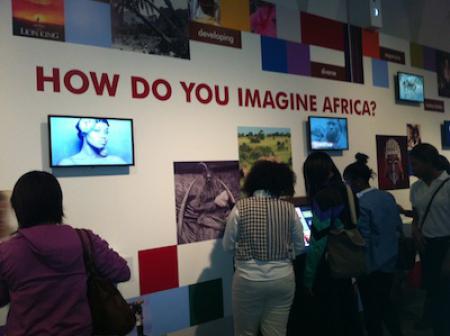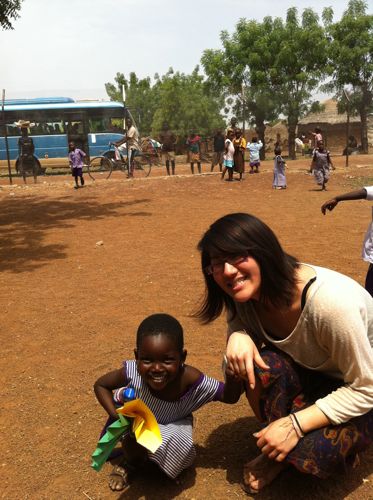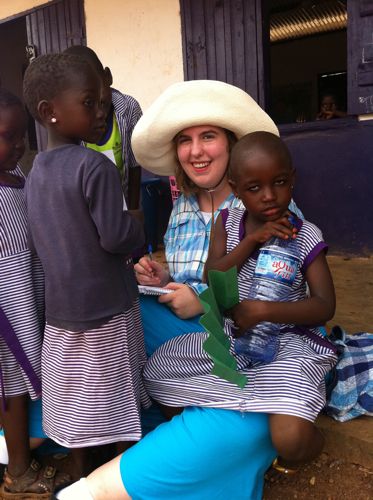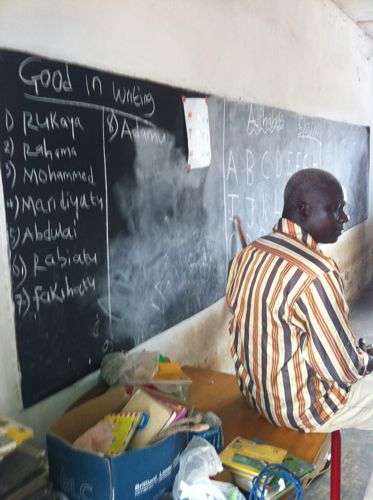Serendip is an independent site partnering with faculty at multiple colleges and universities around the world. Happy exploring!
Ghana: Learning
One Road: Learning and Teaching Between Dalun, Ghana and Bryn Mawr and Haverford Colleges, USA

This is a reflection, dialogue, and resource page for a group of projects, including summer internships, held in common by community leaders and learners in Dalun and Bryn Mawr/Haverford. Please find spaces here for sharing ideas, making connections, and posting links.
Below are some resources to inform you about the village of Dalun; NGO partners of the Bi-Co in Ghana; education in Ghana; Ghanaian history; issues of representation, access, privilege, and colonialism; and approaches to cross-cultural collaboration. There is also a discussion forum for blogging, cross-talk, and sharing links. Welcome!
Welcome!
Please join us here to read and exchange about the journey our 360 Program, "Learning and Narrating Childhoods," is taking to Ghana over spring break. We are 16 undergraduate women from Bryn Mawr and Haverford Colleges, two faculty members, a Bryn Mawr College alumna, and two colleagues from Northern Ghana's Titagya Schools. Our destinations are Titagya Schools, in Dalun, and the University of Ghana, Legon, near Accra. We will be learning with young learners, teachers, community members, university students, and faculty. We are exploring how languages, lives, and futures interact as children and communities grow and change.
This picture is from our joint field trip earlier this semester with Parkway West High School students to UPenn's Museum of Archeology and Anthropology's "Imagine Africa" exhibition. There we explored and interacted with representations of the continent in order to participate in a renovation of the museum's exhibition of African art and technologies. Now as we set off to visit and volunteer in Ghana, will will continue revise imaginings with new experiences and future possibilities.

Field Placement Reflection (week 1)
Last week my group had a Skype meeting with the co-director of Arise, to try to get a basic understanding of what our goals are for working with Arise. It is a relatively new program and their website did not provide us with a significant amount of information about the formal structure or clear programs, goals, plans, and objectives of the company. So, we were hoping that talking with Mr. B. would provide us with that clarity that we were seeking. Some members of our group seemed to feel as though not much progress was made during the Skype call since he did not really provide us with any specific tasks or actions he wanted us to perform for him. However, I felt like this was an indicator in its own form; we are going to have to put just as much thought into generating projects and collaboration activities as Mr. B and his partner are. One of the things that we were able to get out of the Skype call was the importance of story telling in Ghanaian culture. So, we took this and ran with it when looking forwards and attempting to create a plan for our engagement in this exchange. We began brainstorming ways that we could use technology as a form of story telling and we played with the idea of that being the theme for one of Arise’s workshops. An idea that arose in Alice’s facebook conversation with Mr. B was the creation of introductory videos that could be shared between the participants in the workshops and us.
Ed, Tech and Society: Unit 1
I felt like this unit was a good introduction and laid down the foundation for the class: defining the terms and posing the big questions to contemplate over the course of the semester. It has encouraged me personally to engage with and explore technology that I have been reluctant to experiment with in the past, including prezi and instagram, and I am excited to continue to learn. We have also established initial contact with our pen pals in Ghana and while we are uncertain about the development of that relationship at this point, I am excited about the possibilities. The prospect of an undeveloped structure to this part of the course is exciting but at the same time, a bit anxiety provoking, and so I hope we can help future participants by laying down some sort of structure for them.

Half the Sky
Hey everybody, I don't really know if this has any place in this Ecological Imaginings class, but maybe if we can imagine the preservation of women to be a form of ecology, not unlike the preservation of all plant life, animal life.
I just wanted to call everyone's attention to this excellent documentary currently being shown on PBS on Mon & Tues nights at 9:00 PM. I imagine you guys have lots of time to watch films, yeah! But this is an amazing series.
"Half the Sky" about gender based violence.
Here's the link to the first & second segment:
http://video.pbs.org/video/2283557115
http://video.pbs.org/video/2283558278
Learning and Narrating Childhoods Retrospective: Learning from Our 360 Final Projects (Prezi format)
INTRODUCTION: What does it mean to visit an African country with a class from a US college in order to learn?
Alice Lesnick, Term Professor of Education, Bryn Mawr College
July, 2012
360: Learning and Narrating Childhoods (Spring, 2012) was a cluster of three courses, one in Education, one in Literature, and one in Psychology. 15 Students from a broad range of majors, years, and backgrounds undertook a cross-disciplinary, cross-cultural study of child development, with a particular focus on the role of language and literacy in forming and channeling personal and group identities.
thinking about culture
Today I learned a lot about how culture works. In the morning, a student observed that a question that had emerged during our class's processing of our trip was doing work in the culture of our group. This insight suggests that questions can be instances of cultural work/production, and as such are embedded in a particular context and time . . . the student suggested that we did not need to regard this question as transcontextual: rather, that its being posed could be usefully understood as in-time cultural work that we could let be without the letting be constitute ignoring or neglect. So interesting!
In the afternoon I got to attend the panel discussion with Derrick Ashong and Soulfege, sponsored by Ghanaian Music/Global Entrepeneurship. Derrick Ashong spoke about their group's interest in breaking the music industry paradigm. He explained that for humans, the fulfillment of expectations, even with unwelcome outcomes, is deeply satisfying. So, if mother says stay away from that young man, and that young man does indeed prove inconstant, mother is gratified even though the outcome is not welcome. This is a powerful illustration of how culture works. Ashong and Soulfege are trying to change culture, or recreate it, by establishing new expectations for contemporary Afropolitcal music.

NGOs in Ghana – intial reflections on group project & trip
While in Ghana, I couldn’t help but think about my group’s discussion of NGOs in Ghana and their work, and compare these things to the realities that we saw on the ground. I still have a lot of questions, but my post is long overdue, so observations + questioning will have to be sufficient for now!
During our project, one of the more resonant questions for me was, “How do NGOs collaborate and is this collaboration successful?” I think this question guided some of my observations during the trip.
Observations: Looking around the Dalun Youth Association (DYA) building, I saw some posters, asked some questions. All this happened very quickly, so I’m not 100% this is the correct information, but I’ll relay what I remember and wrote down.
DYA exists to bring the youth together – students gather here and “because they are together, they are stronger and can advocate for the needs of the community, what they see the community needs to develop” (field notes), like new roads to Tamale (which I would also advocate for, for both selfish and unselfish reasons). DYA uses sports as a tool for development – in this rural community, athletic competition is a perfect way to bring people together, both young and old. Once the people are gathered, the youth can spread their message of change. And this message is much more powerful coming from a vibrant, organized youth group.








